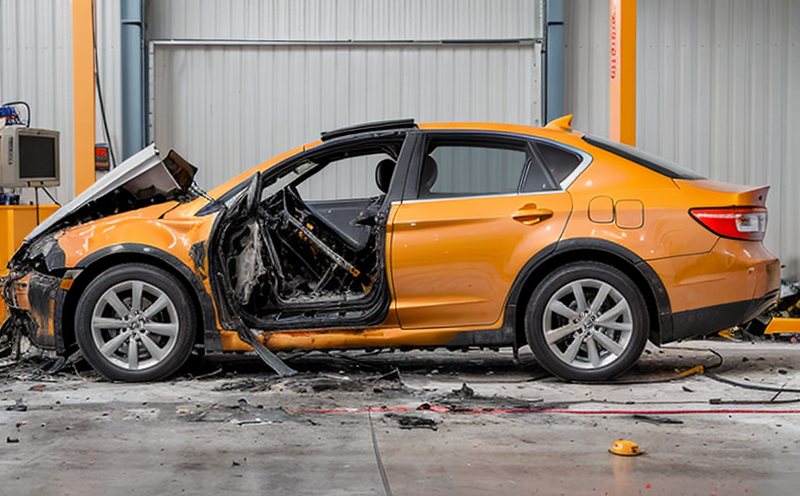UL 1973 Mechanical Abuse Testing of Stationary Energy Storage Batteries
The UL 1973 standard is a critical benchmark in the field of stationary energy storage systems, focusing on ensuring that batteries are capable of withstanding mechanical abuse without compromising safety. This service provides comprehensive testing to meet the rigorous requirements outlined by this standard. Our laboratory offers expert insights and support for quality managers, compliance officers, R&D engineers, and procurement teams who need to ensure their products adhere to UL 1973 standards.
The importance of such mechanical abuse testing cannot be overstated in today's energy storage landscape. With the increasing demand for large-scale stationary batteries, there is a pressing need to guarantee that these systems can withstand harsh environmental conditions and potential accidents without posing a risk to public safety or infrastructure. The UL 1973 standard is designed to address this critical issue by simulating real-world scenarios where mechanical stress may occur.
The testing protocol under UL 1973 involves subjecting batteries to various forms of mechanical abuse, such as drop tests, compression tests, and puncture tests. Each test aims to replicate potential hazards that the battery might encounter during installation or operation in a stationary setting. By conducting these tests, manufacturers can identify weaknesses in their designs early on, allowing for necessary modifications before product release.
The process typically begins with careful preparation of the specimen according to prescribed guidelines within UL 1973. This includes ensuring that batteries are properly mounted and secured during testing to mimic actual operational conditions accurately. Our skilled technicians then proceed with each specified test method using precise instrumentation designed specifically for stationary battery evaluation under such stress.
Upon completion of all required tests, detailed reports are generated summarizing the results observed throughout the entire process. These reports provide critical feedback regarding how well each tested unit performed during exposure to mechanical abuse according to UL 1973 specifications. Additionally, recommendations for improving future designs based on these findings are included in every report.
By leveraging our expertise and facilities dedicated specifically towards compliance with UL 1973 standards, we help clients stay ahead of regulatory requirements while minimizing risks associated with non-compliance penalties or recalls. Our commitment to excellence ensures that you receive accurate data and actionable insights tailored directly toward enhancing product quality.
Why It Matters
The UL 1973 standard plays a pivotal role in ensuring the safety of stationary energy storage systems by mandating rigorous mechanical abuse testing. This is particularly important given the growing use of these systems across various sectors, including renewable energy installations, data centers, and electric vehicle charging stations.
- Enhanced Safety: Compliance with UL 1973 helps prevent accidents caused by battery failures under extreme conditions.
- Regulatory Compliance: Adhering to industry standards like UL 1973 demonstrates a commitment to safety and quality, which is essential for regulatory approval.
- Customer Trust: Meeting these stringent requirements builds trust with consumers who rely on safe and reliable energy storage solutions.
Incorporating mechanical abuse testing into your product development cycle ensures that any potential issues are addressed early in the design phase, reducing costs associated with post-release modifications or recalls. This proactive approach not only enhances overall product quality but also contributes significantly to brand reputation and market acceptance.
Scope and Methodology
The scope of UL 1973 mechanical abuse testing encompasses a range of tests aimed at evaluating the structural integrity and performance characteristics of stationary energy storage batteries under various abusive conditions. These tests are designed to simulate realistic situations that might occur during installation, transportation, or operation.
- Drop Tests: Batteries are dropped from specific heights onto hard surfaces to assess their resistance to impacts.
- Puncture Tests: Specimens are subjected to sharp objects penetrating them at high speeds to evaluate puncture resistance.
- Compression Tests: Batteries are compressed between two plates to determine their ability to withstand compression forces without failure.
The methodology involves careful preparation and mounting of the battery according to UL 1973 guidelines, followed by precise execution of each test method using specialized equipment. Our technicians ensure that all parameters closely follow the specified standards to obtain accurate results.
Upon completion of testing, detailed reports are generated summarizing the observed outcomes during each test. These reports provide comprehensive analysis and recommendations for improving product design based on the findings. This information is invaluable for continuous improvement efforts aimed at enhancing both performance and safety.
Competitive Advantage and Market Impact
Adhering to UL 1973 standards offers significant competitive advantages in both domestic and international markets. By ensuring that your products meet these stringent requirements, you demonstrate a commitment to safety and quality, which is increasingly becoming a key factor for buyers.
- Increased Market Share: Compliance with industry standards like UL 1973 can attract more customers by establishing trust in the reliability of your products.
- Better Brand Reputation: Demonstrating adherence to high-quality testing protocols enhances brand reputation and builds long-term customer loyalty.
- Reduced Risk of Recalls: By identifying potential issues early through comprehensive mechanical abuse testing, you minimize the risk of product recalls, which can be costly and damaging to your business.
In today’s competitive landscape, meeting or exceeding industry standards sets you apart from competitors. It not only ensures compliance with regulations but also positions your company as a leader in safety-conscious practices.





